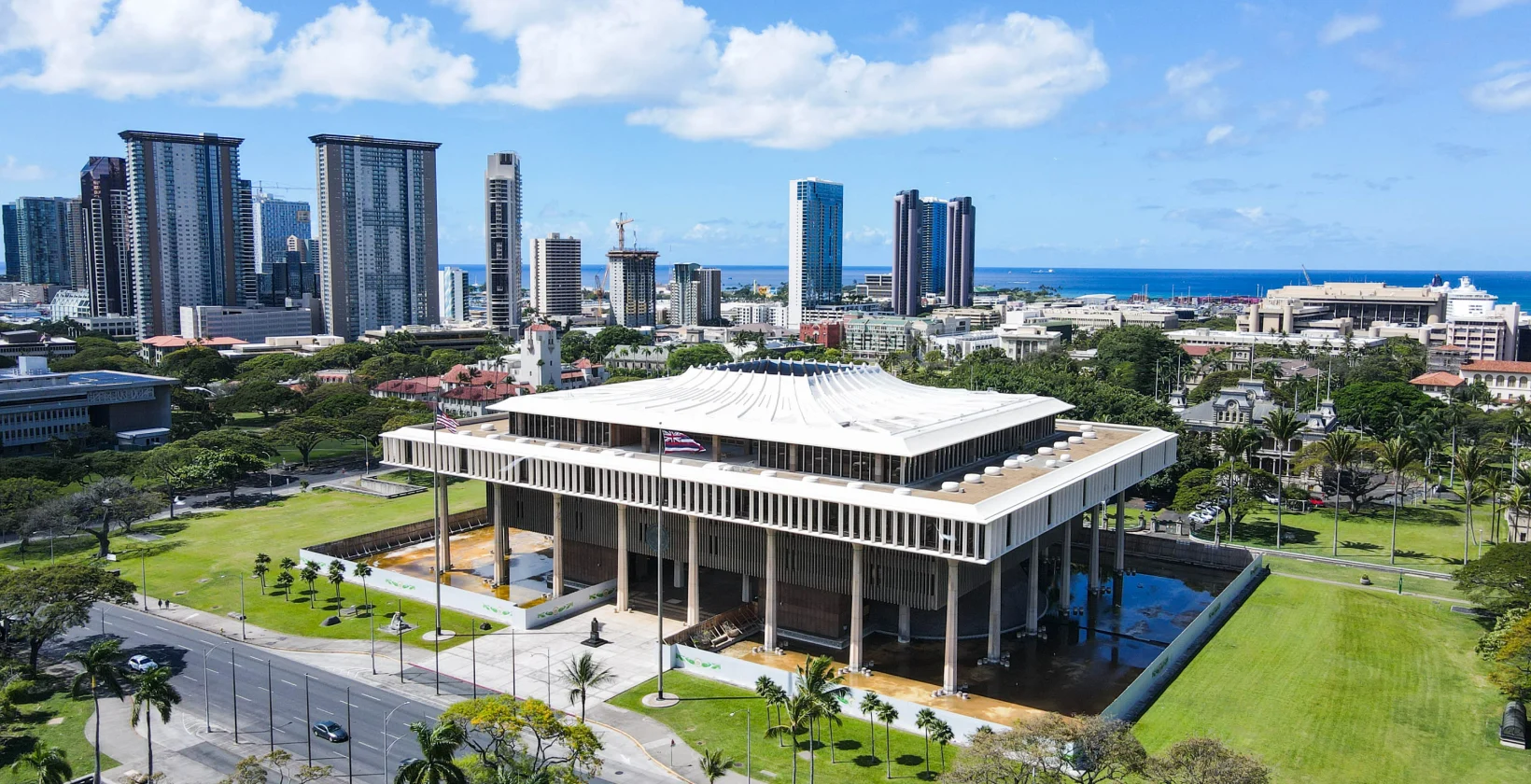In December 2023, the Hawai‘i State Energy Office released its Statewide Decarbonization Strategy. The report highlights how Hawai‘i can achieve its statewide goals for a 50% reduction in greenhouse gas emissions by 2030 and net-negative emissions by 2045–aligning the state with global targets that scientists say we need to meet in order to avoid the worst impacts of climate change.
The 350-page report laid bare the harsh reality for Hawai‘i’s transition– more aggressive action must be taken in all economic sectors to meet the state’s mandate to cut its carbon emissions to net-zero. Under the current “business-as-usual” scenario, which already assumes we meet our 100% clean energy goals, Hawai‘i will fall short and only reach a 54% decline in economy-wide emissions by 2045.
Fortunately, the report provided a handful of policy recommendations and the following key takeaways. First, energy efficiency and energy conservation remains the most cost-effective way to reduce emissions. As the report’s analysis reaffirms, “aggressive energy efficiency measures are the most cost-effective measures to reduce emissions. While this may not be the most glamourous path forward, the results are clear – energy efficiency saves people money and provides the foundation for substantial emissions reduction potential.”
Second, Hawai‘i must focus on decarbonization of the transportation sector and move urgently to sustainable transportation choices. Transportation represents the largest source of the state’s carbon emissions. Reducing emissions from ground, marine, and aviation fuels poses numerous challenges for our islands. A combination of infrastructure upgrades and policies will be needed to both mandate and incentivize zero-emission vehicles, decarbonized fuels, and multimodal transportation options such as walking, biking, and public transportation. If we want to ensure a stable climate future, we must boldly overcome these challenges.
During the 2024 legislative session, Blue Planet is prioritizing policy solutions that align with the state’s decarbonization pathways, while also addressing affordability and accessibility for the people of Hawai‘i. These priorities fall into three key areas of focus:
- Prioritizing affordability through energy efficiency
- Taking bold action on clean ground transportation
- Support for geothermal and hydrogen research
![]()
Energy Efficiency Can Ensure a More Affordable, Clean Energy Future
Energy efficiency will play a foundational role in helping Hawai‘i achieve its carbon reduction goals—the cleanest and cheapest energy is the energy we don’t use.
Establish a Hawai‘i Home Energy Assistance Program (HB2739, SB3263):
Hawai‘i has the nation’s highest residential electricity rates, yet it receives the least amount of funding for the Federal Low Income Home Energy Assistance Program (LIHEAP). In 2023, Hawai‘i received $7.8M in federal assistance, which served fewer than 9,000 households. The purpose of this bill is to create a Hawai‘i Home Energy Assistance Program to provide families with electricity bill assistance, crisis assistance to prevent disconnection, home weatherization, and energy related home repairs. Additionally, this program would streamline the eligibility and application process and provide recipients with energy audits and energy efficiency upgrades to reduce families’ electricity costs over the long-term. Sample testimony.
Extend the Energy Efficiency Portfolio Standard (EEPS) beyond 2030 (HB2389, HB1828, SB3078, SB2122):
Since the EEPS goal was established in 2009 as part of the Hawai‘i Clean Energy Initiative, Hawai‘i has made impressive progress towards its clean energy goals, including the expansion of the renewable portfolio standards to target 100% renewable electricity by 2045. But the EEPS goal remains a 4,300 gigawatt-hour reduction by 2030 (with no goal beyond that date). As electric utilities, Hawai‘i Energy, and other stakeholders plan for a 100% renewable future by 2045, it is similarly necessary to extend the EEPS goal beyond 2030 to align planning across the sector. Sample testimony.
Bold Action on Clean Ground Transportation
While we have made progress on decarbonizing the electricity sector, ground transportation remains a significant source of greenhouse gas emissions in Hawai‘i. Our focus this year is to make mobility options like electric vehicles and electric bikes accessible for more Hawai‘i residents.
100% EV Sales by 2035:
If we are serious about achieving our clean transportation and carbon goals, we need to set clear policies on what types of vehicles are allowable in Hawai‘i. Fossil fuel-powered internal combustion engines are simply incompatible with a stable climate. We need to provide customers, auto dealers, and planners direction on what is coming so that they can plan for a smooth and equitable transition to clean transportation. We are continuing our push for Hawai‘i to set a goal for 100% renewable ground transportation and to require that all new cars sold after 2035 be battery-electric or hydrogen fuel cell vehicles.
EV-Ready Affordable Housing Incentives (HB2100):
Electric vehicles (EVs) are the fastest growing segment of new cars in Hawai‘i, with major automakers already committing to producing only zero-emission vehicles within the next few years. To help increase equitable access to electric vehicles and future-proof new construction, Blue Planet would like to establish an electric vehicle (EV)-ready rebate for new affordable housing developments. The most challenging aspect of EV charger installation is the common lack of electrical capacity to support charging infrastructure. In buildings without the proper wiring and conduit, tenants may pay up to 91% more for expensive retrofits to upgrade power capacity and wiring to their parking stalls. Sample testimony.
Expand the electric bike and moped rebate program (SB3021):
Rapid decarbonization of our transportation sector will require more than just switching to electric cars. Expanded access to electric mobility options like e-bikes and electric mopeds is critical to an equitable and clean transportation future. The goal of this measure is to create a more robust and expanded electric mobility rebate program under the Hawai‘i Department of Transportation. This would reduce the cost of living and cost of transportation for local residents by providing rebates for the purchase of electric bicycles, electric mopeds, and other modes of electric mobility options that are cheaper and more widely accessible than electric cars. Sample testimony.
Increased Geothermal and Hydrogen Research
Hawai‘i is fortunate to have a variety of clean energy options to meet our 100% renewable portfolio standards by 2045. While solar and wind energy face challenges of intermittency, geothermal and green hydrogen technologies have the potential to provide low-carbon, firm renewable energy– expanding and diversifying our local energy system as we move our islands closer to 100%.
Support Funding for Geothermal and Hydrogen Research (HB2105, HB2569, SB2518, SB2577):
Blue Planet will be supporting bills that provide funding for assessing geothermal availability across the Hawaiian Islands, as well as funding to assess how hydrogen can contribute to statewide renewable energy and decarbonization goals. With a growing interest from policymakers, state agencies, scientific researchers and others to further explore geothermal and hydrogen options for Hawai‘i, Blue Planet plays an important advocacy role to help ensure the exploration and potential development of these renewable energy sources will meaningfully engage with community stakeholders, provide good jobs, and reduce emissions and energy costs in Hawai‘i.

We also acknowledge that much of the focus during the 2024 legislative session will deservedly be on the critical Maui wildfire recovery efforts. Blue Planet is committed to supporting policies that center the needs of Lahaina residents who were directly impacted– ensuring community-led recovery planning efforts, addressing issues of energy affordability and grid resiliency, and rebuilding sustainably in response to a changing climate.
![]()
Become a Climate Advocate
Want to make an impact during the 2024 legislative session? Sign up for our Climate Advocates email list to receive updates on key legislation, digestible explanations of the impacts and implications of the proposed bills, and draft testimony to make it easy to make your voice heard.
